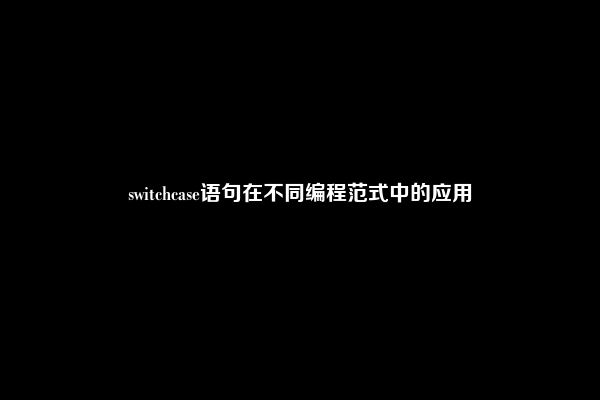switch-case 语句是一种多分支选择结构,它根据一个表达式的值来选择执行相应的代码块。这种结构在不同编程范式中都有广泛的应用,包括过程式编程、面向对象编程和函数式编程。

- 过程式编程:在过程式编程中,
switch-case语句通常用于处理基于某个变量值的多个条件分支。这种结构可以使代码更加清晰和易于维护,因为它将不同条件下的处理逻辑分开,而不是使用多层嵌套的if-else语句。
#include<stdio.h>
int main() {
int day = 3;
switch (day) {
case 1:
printf("Monday\n");
break;
case 2:
printf("Tuesday\n");
break;
case 3:
printf("Wednesday\n");
break;
default:
printf("Invalid day\n");
}
return 0;
}
- 面向对象编程:在面向对象编程中,
switch-case语句可以用于实现多态性,即根据对象的类型来执行不同的操作。这可以通过在基类中定义一个虚函数,并在派生类中重写该函数来实现。然后,可以使用switch-case语句来根据对象的类型调用相应的函数。
#include<iostream>
class Animal {
public:
virtual void makeSound() = 0;
};
class Dog : public Animal {
public:
void makeSound() override {
std::cout << "Woof!"<< std::endl;
}
};
class Cat : public Animal {
public:
void makeSound() override {
std::cout << "Meow!"<< std::endl;
}
};
int main() {
Animal *animal = new Dog();
int animalType = 1; // 1 for Dog, 2 for Cat
switch (animalType) {
case 1:
static_cast<Dog*>(animal)->makeSound();
break;
case 2:
static_cast<Cat*>(animal)->makeSound();
break;
default:
std::cout << "Invalid animal type"<< std::endl;
}
delete animal;
return 0;
}
- 函数式编程:在函数式编程中,
switch-case语句可以用于实现模式匹配,即根据输入的形式来执行不同的操作。这可以通过使用函数式编程语言提供的模式匹配特性来实现,例如 Haskell 中的case语句。
data Day = Monday | Tuesday | Wednesday
dayToString :: Day -> String
dayToString day = case day of
Monday -> "Monday"
Tuesday -> "Tuesday"
Wednesday -> "Wednesday"
main :: IO ()
main = putStrLn $ dayToString Wednesday
总之,switch-case 语句在不同编程范式中都有广泛的应用,可以帮助我们编写更加清晰、易于维护的代码。

网友留言: